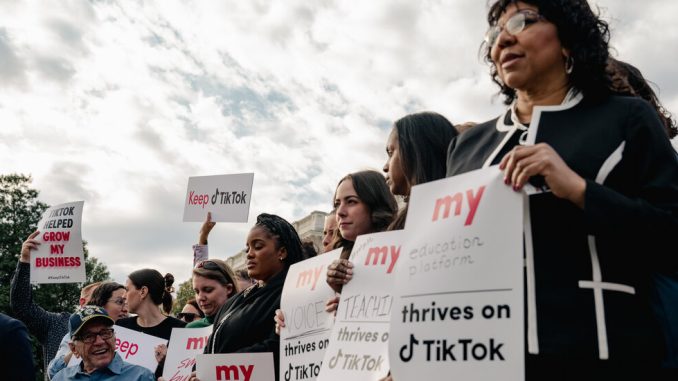
Washington lawmakers introduced a bill this week calling for TikTok to cut ties with its Chinese parent company or face a ban in the United States. When many users opened the popular app on Thursday, the company greeted them with a message to oppose the legislation, prompting a flood of phone calls to several Capitol Hill offices.
“Stop a TikTok shutdown,” the message on the app read. It included a button for people to call their representatives, saying: “Let Congress know what TikTok means to you and tell them to vote NO.”
By noon, the phone lines for members of Congress were overwhelmed by calls, according to posts from lawmakers’ staff members on X and two congressional aides with knowledge of the situation. Some of the callers appeared to be teenagers, while others hung up as soon as they were connected, the aides said. One of the aides said their office had received about a hundred of the calls and another aide said their office had received more than a thousand. One staff member posted a screenshot to X showing that TikTok also sent a push alert to some users.
Some users said on X that they were unable to use the app before placing the call. TikTok told The New York Times that users could swipe right to get rid of the message, which may have been confusing because users typically swipe up to see the next video on the app. The company also said that the “X” to close the page wasn’t visible for some users at first but that it later fixed that.
Technology companies have often sought to rally users in response to legislation, but rarely is the effort so overt.
Lawmakers on the House Energy and Commerce Committee approved the legislation 50-0 on Thursday. Steve Scalise of Louisiana, the House majority leader, said on X that the full body would vote on the legislation next week. It’s aimed at forcing TikTok’s Chinese owner, ByteDance, to sell the app. The House bill is one of several efforts over the past year aimed at curtailing TikTok because of concerns that ByteDance’s relationship with Beijing poses risks to national security.
Representatives Mike Gallagher, a Wisconsin Republican, and Raja Krishnamoorthi, an Illinois Democrat, who are co-sponsors of the bill, criticized TikTok’s message, saying it was misleading. “Here you have an example of an adversary-controlled application lying to the American people and interfering with the legislative process in Congress,” they said.
In a post on X on Thursday, the company said, “This legislation has a predetermined outcome: a total ban of TikTok in the United States.”
TikTok declined to answer questions about the strategy and how many users it reached with its campaign. It had previously said that lawmakers’ fears were unfounded, including because its U.S. operations and user data are protected from the rest of the organization.
The legislation faces a long path to becoming law. Representative Mike Johnson of Louisiana, the speaker of the House, said on Thursday he supported the bill. If the full House approves the legislation it will go to the Senate.
Senator Mark Warner, Democrat of Virginia, who has introduced his own legislation aimed at the app, said he had some concerns about how the new bill directly named TikTok and ByteDance, a fact that can be cited in a legal challenge to legislation. But, he said, “I have tremendous respect for Congressman Gallagher and I’m going to be taking a close look at this bill.”
Senate Chuck Schumer, the majority leader, determines what legislation is considered by the full Senate. In a statement, he said he was talking with other Democrats about the legislation.
“I will listen to their views on the bill and determine the best path,” he said.
Mike Nellis, a Democratic digital strategist and a former senior adviser to Kamala Harris, said TikTok’s alert to users was a “smart organizing tactic.”
But, he added, “I would be worried the tactic would backfire and highlight the actual problem, which is that a foreign-owned tech company has so much influence inside the United States.”
Mr. Nellis, who has worked on campaigns that have advertised through TikTok, also said, “I can imagine members of Congress feeling more pressure to take action than before, after being inundated with calls like this.”
On Thursday afternoon, the House Energy and Commerce Committee sent a note to lawmakers’ offices with advice about how to respond to the flood of calls. The note, which was obtained by The New York Times, featured the committee’s arguments in favor of the bill and “phone scripts” for responding directly to callers.
One of the scripts suggested that staff members tell callers that “TikTok has been lying about the bill” and that the app “has worked really hard to hide” its relationship to China.
“The bill requires TikTok to break off that relationship,” the committee’s script said. It advised staff members to tell callers that when the app does that, “you can keep using TikTok” free of Chinese influence.


Be the first to comment